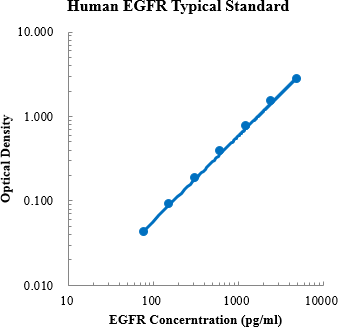
Human EGFR/HER1/ErbB1 ELISA Kit
$350.00 – $450.00
| Sample Type | Serum, plasma, cell culture supernatant, and other biological samples |
|---|---|
| Sample Volume | 100 μL |
| Sensitivity | 5.79 pg/mL |
| Range | 78.13 pg/mL – 5000 pg/mL |
| Assay Time | 3.5 h |
| Recovery | 87% – 119% |
| Average Recovery | 1.06 |
| Intra Precision | 2.2% – 3.5% |
| Inter-Precision | 2.3% – 4.4% |
| Platform | ELISA |
| Plate | Detachable 96-well plate |
| Size | 96T/48T |
| Storage | If the reagent kit is unopened, it should be stored at 4℃. However, if it has been opened, the standard solution should be stored at -20℃, while the other components should be stored at 4℃. |
| Delivery | 4℃ blue ice transportation |
| Components | 96-well polystyrene enzyme-linked immunosorbent assay (ELISA) plate coated with anti-EGFR/HER1/ErbB1 monoclonal antibody Human EGFR/HER1/ErbB1 freeze-dried standard EGFR/HER1/ErbB1 detect Antibody Standard Diluent Assay Buffer(10×) Substrate TMB Stop Solution Washing Buffer(20×) Sealing Film |
| Assay Principle | This kit utilizes the double antibody sandwich enzyme-linked immunosorbent assay (ELISA) detection technique.Specific anti-human EGFR antibodies are precoated on a high-affinity ELISA plate. Standard samples, test samples, and the detection antibody labeled with horseradish peroxidase are added to the wells of the ELISA plate. After incubation, EGFR present in the samples binds to the solid-phase antibodies and the detection antibodies. After washing, a colorimetric substrate, TMB, is added and the plate is incubated in the dark for color development. The intensity of the color reaction is directly proportional to the concentration of EGFR in the samples.A stop solution is added to terminate the reaction, and the absorbance value is measured at a wavelength of 450 nm (with a reference wavelength range of 570-630 nm). |
Targets
EGFR
EGFR Target Infomation Overview
- Target Symbol: EGFR, epidermal growth factor receptor
- Gene Groups: Erb-b2 receptor tyrosine kinases
- Alias: ERBB1; ERRP
- Previous Names: ERBB
- Alias Names: erythroblastic leukemia viral (v-erb-b) oncogene homolog (avian); erb-b2 receptor tyrosine kinase 1; epidermal growth factor receptor (avian erythroblastic leukemia viral (v-erb-b) oncogene homolog)
EGFR, epidermal growth factor receptor Target Infomation by Species
[su_tabs][su_tab title=”Human” disabled=”no” anchor=”” url=”” target=”blank” class=”tab-human”]
Human EGFR Target Information
- Target Symbol: EGFR, epidermal growth factor receptor
- Alias:
- avian erythroblastic leukemia viral (v-erb-b) oncogene homolog
- cell growth inhibiting protein 40
- cell proliferation-inducing protein 61
- EGFR vIII
- epidermal growth factor receptor (erythroblastic leukemia viral (v-erb-b) oncogene homolog, avian)
- epidermal growth factor receptor tyrosine kinase domain
- erb-b2 receptor tyrosine kinase 1
- ERBB
- ERBB1
- ERRP
- erythroblastic leukemia viral (v-erb-b) oncogene homolog
- HER1
- mENA
- NISBD2
- PIG61
- proto-oncogene c-ErbB-1
- receptor tyrosine-protein kinase erbB-1
- NCBI_Gene: 1956
- UniProtKB: P00533
Human EGFR Predicted Functions
Enables several functions, including actin filament binding activity; enzyme binding activity; and epidermal growth factor-activated receptor activity. Contributes to nitric-oxide synthase regulator activity. Involved in several processes, including positive regulation of macromolecule metabolic process; regulation of intracellular signal transduction; and regulation of protein metabolic process. Acts upstream of or within epidermal growth factor receptor signaling pathway and positive regulation of cell population proliferation. Located in several cellular components, including basolateral plasma membrane; endosome; and membrane raft. Part of receptor complex. Is active in ruffle membrane. Colocalizes with endosome. Implicated in several diseases, including colorectal cancer; lung non-small cell carcinoma (multiple); pancreatic cancer; prostate cancer; and pulmonary tuberculosis. Biomarker of several diseases, including Human papillomavirus infectious disease; breast cancer (multiple); carcinoma (multiple); chronic obstructive pulmonary disease; and pulmonary hypertension.
[/su_tab]
[su_tab title=”Mouse” disabled=”no” anchor=”” url=”” target=”blank” class=”tab-mouse”]
Mouse Egfr Target Information
- Target Symbol: Egfr, epidermal growth factor receptor
- Alias:
- 9030024J15Rik
- AI552599
- avian erythroblastic leukemia viral (v-erb-b) oncogene homolog
- avian erythroblastosis oncogene B
- Erbb
- Errb1
- expressed sequence AI552599
- RIKEN cDNA 9030024J15 gene
- wa-2
- wa2
- Wa5
- waved 2
- waved 5
- NCBI_Gene: 13649
Mouse Egfr Predicted Functions
Enables epidermal growth factor binding activity and epidermal growth factor-activated receptor activity. Involved in cellular response to amino acid stimulus and positive regulation of fibroblast proliferation. Acts upstream of or within several processes, including animal organ development; epidermal growth factor receptor signaling pathway; and protein autophosphorylation. Located in several cellular components, including basolateral plasma membrane; endocytic vesicle; and perinuclear region of cytoplasm. Is expressed in several structures, including alimentary system; brain; integumental system; limb; and respiratory system. Used to study Coronavirus infectious disease and aortic valve disease. Human ortholog(s) of this gene implicated in several diseases, including colorectal cancer; lung non-small cell carcinoma (multiple); pancreatic cancer; prostate cancer; and pulmonary tuberculosis. Orthologous to human EGFR (epidermal growth factor receptor).
[/su_tab]
[su_tab title=”Rat” disabled=”no” anchor=”” url=”” target=”blank” class=”tab-rat”]
Rat Egfr Target Information
- Target Symbol: Egfr, epidermal growth factor receptor
- Alias:
- avian erythroblastic leukemia viral (v-erbB) oncogene homolog
- Egfr-related peptide
- Epidermal growth factor receptor formerly avian erythroblastic leukemia viral (v-erbB) oncogene homolog (Erbb1)
- Epidermal growth factor receptor, formerly avian erythroblastic leukemia viral (v-erbB) oncogene homolog (Erbb1)
- ErbB-1
- ERBB1
- Errp
- NCBI_Gene: 24329
Rat Egfr Predicted Functions
Enables several functions, including calmodulin binding activity; epidermal growth factor binding activity; and epidermal growth factor-activated receptor activity. Involved in several processes, including animal organ development; neurogenesis; and positive regulation of cell communication. Located in several cellular components, including apical plasma membrane; basolateral plasma membrane; and cytoplasmic vesicle. Used to study bronchiolo-alveolar adenocarcinoma; dilated cardiomyopathy; and high grade glioma. Biomarker of several diseases, including Parkinsonism; acute kidney failure; lung disease (multiple); median neuropathy; and peptic esophagitis. Human ortholog(s) of this gene implicated in several diseases, including colorectal cancer; lung non-small cell carcinoma (multiple); pancreatic cancer; prostate cancer; and pulmonary tuberculosis. Orthologous to human EGFR (epidermal growth factor receptor).
[/su_tab][/su_tabs]
EGFR Target News
[catlist tags=”egfr” template=targetnews thumbnail=yes thumbnail_class=”related-post-media clr” thumbnail_size=833]





